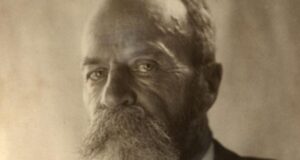The BEST: The Will to Believe

Summary: “It is wrong always, everywhere, and for anyone, to believe anything upon insufficient evidence.” So claimed W.K. Clifford in an 1879 essay. In a celebrated lecture, “The Will to Believe” (1896), William James responds critically to Clifford’s striking and sweeping thesis.
Clifford called his essay “The Ethics of Belief,” and, indeed, presented his thesis as a dictate of morality. Adherence to it, he held, is “a bounden duty to mankind.” The import for religious beliefs, though understated in the essay, is unmistakable: it is morally wrong to hold such beliefs, as we lack sufficient evidence.
An eminent psychologist and a founder of the American philosophical movement called pragmatism, James sought to convince his audience of “our right to adopt a believing attitude in religious matters in spite of the fact our merely logical intellect may not have been coerced.” (He remarked later in life that he should have called the essay “The Right to Believe.”) He thinks that Clifford wrongly ignores the harmful effects of waiting for “sufficient evidence” and overlooks the legitimate role that passion plays—and should play—in forming beliefs in certain circumstances.
James’s central thesis is this:
Our passional nature not only lawfully may, but must, decide an option between propositions, whenever it is a genuine option that cannot be decided on intellectual grounds.
An option is considered genuine when it meets three conditions:
- It is living rather than dead (i.e., it has some appeal);
- It is forced rather than avoidable (if I say, “accept this truth or go without it,” and you sit on the fence, you have in effect chosen to go without the truth—that’s a forced option);
- It is momentous rather than trivial (i.e., it presents a unique opportunity).
The religious option is living, forced, and momentous, and the intellect cannot determine the truth or falsehood of religious tenets. If you don’t choose to believe, but instead remain agnostic, you lose the goods that belief in the religious hypothesis would bring, just as if you flatly denied the truth of religion. “To say under such circumstances ‘Do not decide, but leave the question open,’ is itself a passional decision—just like deciding yes or no—and is attended with the same risk of losing truth.”
Why this is The BEST: In contemporary philosophy, Clifford’s thesis is often regarded as untenable. Almost all people hold beliefs for which philosophers show we lack truly sufficient evidence: “an external world exists,” “memories are reliable,” “there are other minds,” “inductive reasoning is reliable,” and “reason is trustworthy.” Moreover, as philosopher Peter Van Inwagen argues, religion’s critics wield a double standard. What they require of religionists by way of evidence far exceeds what they require for beliefs in virtually any other branch of philosophy, or in areas like politics, ethics, economics, and history.
As opposed to Clifford’s “evidentialist” approach, “The Will to Believe” is generally characterized as a defense of “pragmatic” rationality, a term normally applied to action but applied here to belief. The most famous pragmatic argument for religious belief is “Pascal’s Wager,” but related arguments are adopted by Immanuel Kant and John Stuart Mill, and some Orthodox philosophers have proposed pragmatic justifications for believing the tenets of Judaism. To be sure, James highlights the benefit of acquiring truth, more than other sorts of reward, but both here and in his later The Varieties of Religious Experience it is clear that religion supplies additional vital and choice-worthy goods.
Beyond launching a pragmatic argument, however, James is making a point about the place of emotions in choices about belief. The “faith-vetoer” is making a passional decision, he argues, no less than one who opts to believe. The believer believes because he hopes to attain truth; the faith-vetoer opts not to believe because he is afraid of error. Out of fear, he adopts the rule “avoid error” rather than the rule “gain truth.” The choice between these rules, writes James, is passional and not purely intellectual:
To preach scepticism to us as a duty until ‘sufficient evidence’ for religion be found, is tantamount to telling us, when in presence of the religious hypothesis, that to yield to our fear of its being error is wiser and better than to yield to our hope that it may be true. It is not intellect against all passions, then; it is only intellect with one passion laying down its law.
And then comes this powerful line: “Dupery for dupery, what proof is there that dupery through hope is so much worse than dupery through fear?” James adds that “a rule of thinking which would absolutely prevent me from acknowledging certain kinds of truth if those kinds of truth were really there, would be an irrational rule.” We hold off believing “at our own peril.”
James’ essay has been pilloried by such illustrious critics as Bertrand Russell and Walter Kaufmann. It has been denigrated as a recipe for wishful thinking, a license for “anything goes.” Concepts like “live option” need more elucidation, especially in a globalized world where so many options seem live. Also, James does not take into account differing probabilities of competing hypotheses; and can a person truly “will to believe”? All these are important challenges. Yet, James articulates something deep about how our most precious and central beliefs are formed. We seek truth, but we also have other goals, such as meaning, security, community, and the possibility of connecting to a supreme being. If some beliefs help procure these goals, then, if the questions are intellectually undecidable and the options are genuine, we not only have reasons to “go for it”—we have the right.
David Shatz is the Ronald P. Stanton University Professor of Philosophy, Ethics, and Religious Thought at Yeshiva University and a member of TRADITION’s Editorial Committee. Click here to read about “The BEST” and to see the index of all columns in this series.

